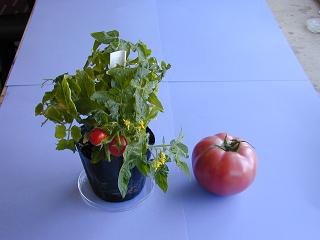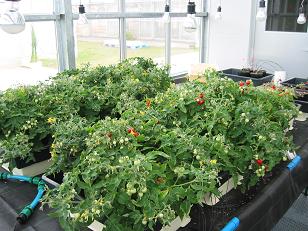Micro-Tom Project “ú–{Œê
Micro-Tom, a min iature and dwarf tomato cultivar, is one of model plants. Since the height of adult plants is about fifteen centimeters, a dense planting and a large-scale experiment are possible. The life cycle of Micro-Tom is about three months and its span is shorter than other general tomato cultivars. Micro-Tom can normally grow in a growth-chamber with lighting system. So the effect of the artificially controlled environments could be easily investigated. The procedure of an Agrobacterium-mediated transformation of Micro-Tom was also developed. Micro-Tom possessing above advantages is an appropriate model-organism in genomic studies. The genetic information would have potential for explanation of various biological mechanisms in fruit plants.
iature and dwarf tomato cultivar, is one of model plants. Since the height of adult plants is about fifteen centimeters, a dense planting and a large-scale experiment are possible. The life cycle of Micro-Tom is about three months and its span is shorter than other general tomato cultivars. Micro-Tom can normally grow in a growth-chamber with lighting system. So the effect of the artificially controlled environments could be easily investigated. The procedure of an Agrobacterium-mediated transformation of Micro-Tom was also developed. Micro-Tom possessing above advantages is an appropriate model-organism in genomic studies. The genetic information would have potential for explanation of various biological mechanisms in fruit plants.
The cultivar Micro-Tom was released for home gardens by Dr. Scott and Dr. Harbaugh (Scott and Harbaugh, 1989). While most dwarf cultivars reduces only their height, the size of leaves and fruits are also scaled down in Micro-Tom. The whole reduced bio-mass has enabled the dense planting, e.g. three plants can be cultivated across about fifteen centimeters in a hanging ba sket.
sket.
Meissner and his colleagues reported that Micro-Tom is usefulness and effectiveness for study of tomato (Meissner et al., 1997). They cultivated 1,357 plants per one square meter and harvested mature fruits in 70 to 90 days from seeding. Meissner et al., (2000) also showed a large-scale selection method based on insertional mutagenesis with the maize Ac/Ds transposable elements on the background of Micro-Tom.
Our Micro-Tom Projects have constructed Micro-Tom EST libraries, and have been predicted UNIGENEs, functions, SNPs, SSR via All 186,405 ESTs from some cultivars.
References
Scott JW, Harbaugh BK (1989)Micro-Tom A miniature dwarf tomato. Florida Agr. Expt. Sta. Circ. 370, 1-6
Meissner R, Jacobson Y, Melmed S, Levyatuv S, Shalev G, Ashri A, Elkind Y, Levy AA. (1997)A new model system for tomato genetics. Plant J. 12, 1465-1472.
Meissner R, Chague V, Zhu Q, Emmanuel E, Elkind Y, Levy AA. (2000) A high throughput system for transposon tagging and promoter trapping in tomato. Plant J. 22, 265-74.
 iature and dwarf tomato cultivar, is one of model plants. Since the height of adult plants is about fifteen centimeters, a dense planting and a large-scale experiment are possible. The life cycle of Micro-Tom is about three months and its span is shorter than other general tomato cultivars. Micro-Tom can normally grow in a growth-chamber with lighting system. So the effect of the artificially controlled environments could be easily investigated. The procedure of an Agrobacterium-mediated transformation of Micro-Tom was also developed. Micro-Tom possessing above advantages is an appropriate model-organism in genomic studies. The genetic information would have potential for explanation of various biological mechanisms in fruit plants.
iature and dwarf tomato cultivar, is one of model plants. Since the height of adult plants is about fifteen centimeters, a dense planting and a large-scale experiment are possible. The life cycle of Micro-Tom is about three months and its span is shorter than other general tomato cultivars. Micro-Tom can normally grow in a growth-chamber with lighting system. So the effect of the artificially controlled environments could be easily investigated. The procedure of an Agrobacterium-mediated transformation of Micro-Tom was also developed. Micro-Tom possessing above advantages is an appropriate model-organism in genomic studies. The genetic information would have potential for explanation of various biological mechanisms in fruit plants.